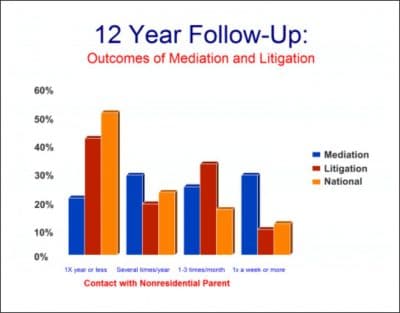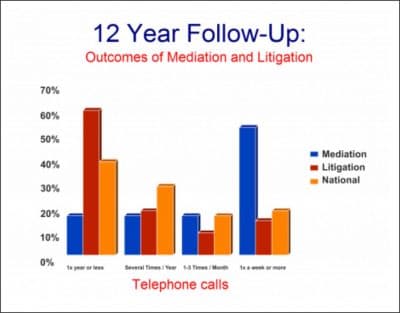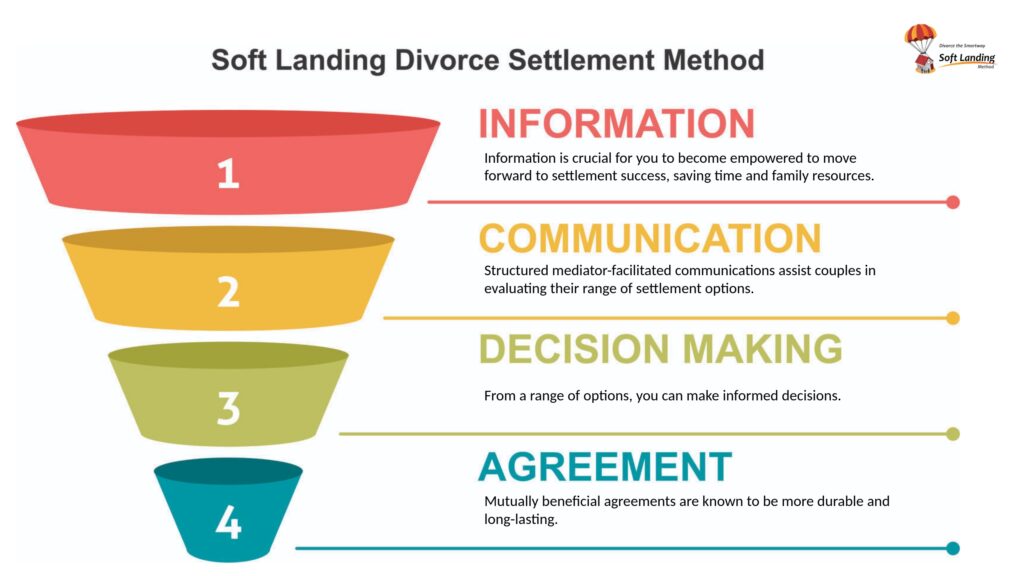In Ontario, a family mediator is vital in helping families resolve disputes and make crucial decisions without needing contentious court battles. Understanding the significance of a family mediator in Ontario is essential for anyone navigating family law matters, such as parenting arrangements, property division, and other family law issues.
Family mediators provide an unwaveringly neutral third-party perspective, guiding families through the mediation process to reach legally binding agreements. By participating in a family mediation program, parties can resolve disputes amicably. This blog post explores how a family mediator, as a trusted and impartial guide, helps families find resolution and peace. Continue reading to discover the crucial role of a family mediator in family disputes.
The Family Mediator in Resolving Disputes in Ontario
Family mediation is a means for individuals to work together to find mutually agreeable solutions. In Ontario, family mediators act as neutral third parties who facilitate discussions between family members. They help clarify issues and guide participants toward reaching an agreement that best suits their unique circumstances. For instance, in a recent case, a couple was able to amicably divide their assets and agree on a custody arrangement for their children through mediation, avoiding a lengthy and contentious court battle.
Mediation encourages parties to find common ground and create sustainable long-term solutions by focusing on open communication and understanding. This collaborative approach can be particularly beneficial for families, as it prioritizes preserving relationships and the best interests of any children involved, fostering a sense of hope and positivity.
One key aspect of family mediation in Ontario is the emphasis on confidentiality. Mediation sessions are private and confidential, allowing family members to openly discuss their concerns without fear of the information being used against them in a legal setting. This confidentiality helps create a safe space for honest communication and problem-solving.
Moreover, family mediators in Ontario undergo specialized training to handle complex emotional dynamics that often arise in family disputes. They are equipped with techniques to manage high-conflict situations and power imbalances, ensuring that all parties can voice their perspectives and concerns equally. This specialized training sets family mediators apart as skilled professionals capable of navigating sensitive issues with empathy and professionalism.
Understanding the Legal Framework for Family Mediation in Ontario
In Ontario, family mediation operates within a legal framework governed by the Family Mediation Act. This legislation sets out the rules and guidelines that mediators must follow. It ensures that the process is fair, impartial, and conducted with the utmost professionalism, thereby protecting the rights and interests of all parties involved.
Mediation in Ontario is confidential, providing a safe and private space for participants to discuss their concerns openly. This confidentiality fosters trust between parties, promoting a collaborative atmosphere where everyone feels comfortable expressing their needs and desires.
Furthermore, the Family Mediation Act in Ontario outlines specific requirements for individuals to become accredited family mediators. This accreditation process involves rigorous training and education to ensure mediators have the necessary skills and knowledge to facilitate productive discussions and help families reach mutually beneficial agreements.
Moreover, the Act also emphasizes the importance of cultural sensitivity and diversity in family mediation. Mediators must respect different cultural backgrounds and beliefs, creating an inclusive environment where all parties feel valued and understood.
Benefits of Choosing a Mediator Over Litigation for Family Conflicts in Ontario
Opting for mediation over traditional litigation can offer numerous benefits for those going through family conflicts in Ontario. Firstly, mediation is typically more cost-effective, avoiding expensive court fees and prolonged legal battles. For example, a study conducted by the Ministry of the Attorney General found that the average cost of a mediated divorce was significantly lower than that of a litigated divorce, with savings of up to [50%].
Choosing mediation over traditional litigation empowers parties to maintain more control over the outcome of their conflict. Rather than relying on a judge’s decision, participants can actively contribute to creating an agreement that best aligns with their needs and values, instilling a sense of control and confidence.
Mediation also promotes healthier communication and collaboration between family members. By engaging in open dialogue, parties can work towards building a foundation of respect and understanding, which can benefit future interactions and co-parenting relationships.
Moreover, choosing mediation can lead to quicker resolutions compared to litigation. Court proceedings can often be drawn out over months or even years, causing additional stress and emotional strain on all parties involved. Conversely, mediation offers a more efficient and timely process, allowing families to reach agreements more expedited. However, it’s important to note that mediation may not be suitable for all cases, particularly those involving domestic violence or extreme power imbalances.
Furthermore, mediation’s confidential nature provides a safe and private space for discussions on sensitive topics. Unlike court hearings, which are a matter of public record, mediation sessions are private and confidential, ensuring that personal matters remain within the confines of the participants and the mediator, fostering a sense of security and comfort.
How to Find a Qualified Family Mediator
When seeking a qualified family mediator in Ontario, certain factors must be considered. Firstly, the mediator must be accredited by a recognized mediation organization, such as the Ontario Association for Family Mediation (OAFM). Accreditation ensures that the mediator has undergone extensive training and adheres to professional standards. To find an accredited mediator, you can start by visiting the OAFM website and using their search tool to find mediators in your area.
It is also crucial to find a mediator with experience in the specific area of family law that pertains to your case. Whether it’s child custody, spousal support, or property division, working with a mediator specializing in your issue can provide valuable insights and guidance.
Moreover, when selecting a family mediator, consider their communication style and approach. A mediator who communicates effectively with all parties and maintains a neutral stance can facilitate productive discussions and negotiations. Additionally, an empathetic and understanding mediator can create a more supportive environment for resolving conflicts.
Furthermore, it is beneficial to inquire about the mediator’s success rate and approach to handling challenging situations. Understanding how the mediator has helped previous clients reach agreements and navigate complex family dynamics can give you confidence in their ability to assist with your case.
Exploring the Process of a Family Mediator
Family mediation in Ontario is a structured and collaborative approach to resolving family conflicts. It is a voluntary process that empowers individuals to decide about their future while promoting open communication and understanding. The process typically involves an initial consultation, a series of mediation sessions, and the drafting of a final agreement. Each session is guided by the mediator, who ensures that all parties have an opportunity to express their views and concerns.
As the initial consultation with the mediator sets the foundation for the mediation process, all parties must be transparent and forthcoming about their concerns and objectives. This helps the mediator understand the family dynamics and issues at hand, allowing them to tailor their approach accordingly.
During mediation sessions, participants are encouraged to express their thoughts and feelings respectfully. The mediator acts as a neutral third party, facilitating productive discussions and guiding the conversation toward constructive outcomes. Through active listening and effective communication techniques, the mediator helps participants navigate complex emotions and conflicts, paving the way for meaningful resolutions.
Upon reaching an agreement, the mediator plays a crucial role in clearly and concisely documenting the contract terms. This document serves as a roadmap for the future, outlining the agreed-upon decisions regarding various aspects of the family’s situation. The mediator’s role in this process is to ensure that the document accurately reflects the parties’ intentions and that all parties understand its contents. Participants are encouraged to review the document carefully and seek legal advice to protect their rights and interests.
Common Issues Addressed with a Family Mediator
Family mediation in Ontario can effectively address various issues related to family conflicts. This includes child custody and access arrangements, spousal support agreements, property division, and other financial matters.
Mediation also provides a platform for resolving disagreements over parenting styles, educational decisions, and any other areas that impact the well-being of children. By encouraging open communication and collaborative problem-solving, mediation helps parents establish effective co-parenting strategies that prioritize the best interests of their children.
Furthermore, family mediation in Ontario can also assist in addressing complex emotional issues that often arise during separation or divorce. Mediators are trained to help families navigate the emotional challenges that come with restructuring family dynamics, such as dealing with grief, anger, or feelings of betrayal. Through guided discussions and active listening, mediators create a safe space for families to express their emotions and work toward healing and understanding.
In addition to the practical matters, family mediation in Ontario can also delve into the psychological aspects of family conflicts. Mediators may explore underlying issues such as communication breakdowns, power imbalances, and unresolved resentments contributing to ongoing disputes. By uncovering and addressing these deeper issues, mediation aims to resolve immediate conflicts and equip families with tools to foster healthier relationships in the long run.
Real-Life Examples of a Family Mediator at work
Many families in Ontario have experienced positive outcomes through family mediation. Real-life examples showcase how mediation can help parties reach fair, practical, and sustainable agreements.
One success story involves a divorcing couple who, through mediation, could divide their assets amicably and agree on a co-parenting plan that prioritized their children’s needs. This enabled both parties to maintain a respectful relationship and minimize the emotional impact on their children.
Another success story involves two siblings who were engaged in a dispute over their late parents’ estate. They could address their grievances, negotiate a fair distribution of assets, and preserve their sibling relationship through mediation.
Furthermore, family mediation in Ontario often involves a trained mediator who facilitates communication between parties, helping them identify common goals and interests. This collaborative approach can lead to creative solutions that may not have been possible through traditional legal processes.
Additionally, family mediation sessions provide a safe and confidential space for parties to express their concerns and explore potential solutions without the fear of judgment or hostility. This environment fosters open communication and encourages parties to actively participate in crafting agreements that meet their unique needs and circumstances.
The Cost of Family Mediation Compared to Traditional Legal Proceedings in Ontario
Family mediation in Ontario is generally more cost-effective than traditional legal proceedings. The cost of mediation can vary depending on the complexity of the conflict and the number of sessions required. However, mediation offers a more affordable alternative than hiring separate lawyers, attending court hearings, and dealing with lengthy litigation processes.
Moreover, parties can save significant time and emotional distress by working towards a resolution without protracted legal battles through mediation. This allows families to move forward more efficiently and with less negative impact on their well-being.
It is important to note that family mediation in Ontario is cost-effective and promotes a more amicable resolution process. Unlike court proceedings, where a judge imposes decisions, mediation empowers individuals to actively participate in crafting their agreements. This collaborative approach can lead to more personalized and sustainable solutions that cater to the unique needs of the family members involved.
Furthermore, mediation’s confidential nature provides a safe space for open communication and exploration of creative solutions. This privacy allows parties to discuss sensitive issues without fear of public scrutiny, fostering a more conducive environment for constructive dialogue and compromise. By prioritizing confidentiality and mutual understanding, family mediation in Ontario offers a holistic and dignified way to resolve disputes, emphasizing respect and cooperation among all parties.























































